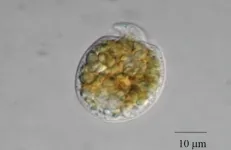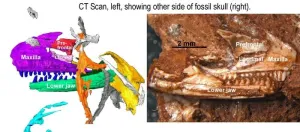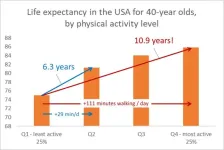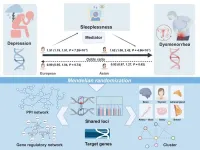(Press-News.org) A large new population study of men over 45 indicates insulin resistance may be an important risk factor for the development of the world’s most common heart valve disease – aortic stenosis (AS).
Published today in the peer-reviewed journal Annals of Medicine, the findings are believed to be the first to highlight this previously unrecognised risk factor for the disease.
It is hoped that by demonstrating this link between AS and insulin resistance – when cells fail to respond effectively to insulin and the body makes more than necessary to maintain normal glucose levels – new avenues for the prevention of the disease could open.
Aortic stenosis is a debilitating heart condition. It causes a narrowing of the aortic valve, restricting blood flow out of the heart. Over time, the valve thickens and stiffens, making the heart work harder to pump blood effectively around the body. If not addressed, this can gradually cause damage that can lead to life-threatening complications, such as heart failure.
People living with AS can take years to develop symptoms, which include chest pain, tiredness, shortness of breath and heart palpitations. Some may never experience symptoms, but may still be at risk of heart failure and death. Previously identified risk factors for AS include age, male sex, high blood pressure, smoking and diabetes.
Insulin resistance, which often develops years before the onset of type 2 diabetes, occurs when cells fail to respond effectively to insulin, the hormone responsible for regulating blood glucose levels. In response, the body makes more insulin to maintain normal glucose levels – leading to elevated blood insulin levels (hyperinsulinemia).
In the current study, researchers analysed data from 10,144 Finnish men aged 45 to 73 years old, all initially free of AS, participating in the Metabolic Syndrome in Men (METSIM) Study. At the start of the study, the researchers measured several biomarkers, including those related to hyperinsulinemia and/or insulin resistance. After an average follow-up period of 10.8 years, 116 men (1.1%) were diagnosed with AS.
The team identified several biomarkers related to insulin resistance – such as fasting insulin, insulin at 30 minutes and 120 minutes, proinsulin, and serum C-peptide – that were associated with increased AS risk. These biomarkers remained significant predictors of AS, even after adjusting for other known risk factors, such as body mass index (BMI) and high blood pressure, or excluding participants with diabetes or an aortic valve malformation.
The researchers then used advanced statistical techniques to isolate key biomarker profiles, identifying two distinct patterns that indicate insulin resistance as a predictor of AS, independent of other cardiovascular risk factors, such as age, blood pressure, diabetes, and obesity.
“This novel finding highlights that insulin resistance may be a significant and modifiable risk factor for AS,” says lead author Dr Johanna Kuusisto, from the Kuopio University Hospital, in Finland.
“As insulin resistance is common in Western populations, managing metabolic health could be a new approach to reduce the risk of AS and improve cardiovascular health in aging populations. Future studies are now warranted to determine whether improving insulin sensitivity through measures such as weight control and exercise can help prevent the condition.”
The major strengths of this study include its large population-based cohort and long follow-up period. However, its limitations include the sole focus on male subjects and the relatively small number of AS cases, which may limit the generalisability of the findings to other populations.
END
World’s most common heart valve disease linked to insulin resistance in large national study
Newly-established link could open doors for new treatments of aortic stenosis – which effects 2% of over 65s worldwide
2024-11-27
ELSE PRESS RELEASES FROM THIS DATE:
Study unravels another piece of the puzzle in how cancer cells may be targeted by the immune system
2024-11-27
Effective immunity hinges on the ability to sense infection and cellular transformation. In humans, there is a specialised molecule on the surface of cells termed MR1. MR1 allows sensing of certain small molecule metabolites derived from cellular and microbial sources; however, the breadth of metabolite sensing is unclear.
Published in PNAS, researchers at the Monash University Biomedicine Discovery Institute have identified a form of Vitamin B6 bound to MR1 as a means of engaging tumour-reactive immune cells. The work involved an international collaborative team co-led by researchers from the University of Melbourne.
According ...
Long-sought structure of powerful anticancer natural product solved by integrated approach
2024-11-27
A collaborative effort by the research groups of Professor Haruhiko Fuwa from Chuo University and Professor Masashi Tsuda from Kochi University has culminated in the structure elucidation and total synthesis of anticancer marine natural products, iriomoteolide-1a and -1b. These natural products were originally isolated from the marine dinoflagellate collected off the Iriomote Island, Okinawa, Japan.
Because of its potent anticancer activity, iriomoteolide-1a is an intriguing natural product that attract immense attention from the chemical community around the globe. ...
World’s oldest lizard wins fossil fight
2024-11-27
A storeroom specimen that changed the origins of modern lizards by millions of years has had its identity confirmed.
The tiny skeleton, unearthed from Triassic-aged rocks in a quarry near Bristol, is at least 205 million years old and the oldest modern-type lizard on record.
Recently, the University of Bristol team’s findings came under question, but fresh analysis, published today in Royal Society Open Science, proves that the fossil is related to modern anguimorphs such as anguids and monitors. The discovery ...
Simple secret to living a longer life
2024-11-27
If everyone in the United States population was as active as the top 25 per cent, individuals over the age of 40 could add five years to their life, according to a new study led by Griffith University researchers.
Physical activity has long been known to be good for health, however estimates have varied regarding how much benefit could be gained from a defined amount of activity, both for individuals and for populations.
This latest study used accelerometry to gain an accurate view of the population’s physical activity levels instead of relying on survey responses as per other studies, and found the benefits were around twice as strong ...
Same plant, different tactic: Habitat determines response to climate
2024-11-27
Plants need light to grow, but too much light can induce damage to the photosynthetic complex known as photosystem II. It is known that plants adapted to growing under full sun repair this light-induced damage more. But this repair activity slows down in colder temperatures. An Osaka Metropolitan University-led international research team has now found some clues to how plants survive in colder regions.
Graduate School of Science Associate Professor Riichi Oguchi and colleagues from Australia, Austria, and Japan grew Arabidopsis thaliana (commonly ...
Drinking plenty of water may actually be good for you
2024-11-27
Public health recommendations generally suggest drinking eight cups of water a day. And many people just assume it’s healthy to drink plenty of water.
Now researchers at UC San Francisco have taken a systematic look at the available evidence. They concluded that drinking enough water can help with weight loss and prevent kidney stones, as well as migraines, urinary tract infections and low blood pressure.
“For such a ubiquitous and simple intervention, the evidence hasn’t been clear and the benefits were not well-established, so we wanted to take a closer look,” said senior and corresponding author Benjamin Breyer, MD, MAS, the Taube ...
Men at high risk of cardiovascular disease face brain health decline 10 years earlier than women
2024-11-27
Men with cardiovascular disease risk factors, including obesity, face brain health decline a decade earlier—from their mid 50s to mid 70s—than similarly affected women who are most susceptible from their mid 60s to mid 70s, suggest the findings of a long term study, published online in the Journal of Neurology Neurosurgery & Psychiatry.
The most vulnerable regions of the brain are those involved in processing auditory information, aspects of visual perception, emotional processing and memory, with ...
Irregular sleep-wake cycle linked to heightened risk of major cardiovascular events
2024-11-27
An irregular sleep-wake cycle is associated with a heightened risk of major cardiovascular events, such as heart attack and stroke, even for those who clock up the recommended nightly hours of shut-eye, finds research published online in the Journal of Epidemiology & Community Health.
Most studies looking at the impact of sleep on health have focused on sleep length and less is known about the impact of sleep patterns, in particular the impact of irregular sleep—defined as variations in the time a person goes to sleep and wakes up.
To explore this further, the researchers drew on 72,269 people aged 40 to 79, taking part in the UK ...
Depression can cause period pain, new study suggests
2024-11-27
Women are twice as likely as men to suffer from depression and often experience more severe physical symptoms. This gender difference is particularly evident during reproductive years and dramatically impacts the lives of hundreds of millions of people worldwide. However, although links between mental health and reproductive health have been found, the associations have remained underexplored.
In a new study published in Briefings in Bioinformatics, researchers from China and the UK have found that depression can increase the chances of a person experiencing menstrual pain (dysmenorrhea).
Shuhe Liu, lead author of the study and a PhD ...
Wistar Institute scientists identify important factor in neural development
2024-11-26
PHILADELPHIA — (Nov. 26, 2024) — The Wistar Institute’s Alessandro Gardini, Ph.D., and lab have shed new light on how certain biological processes determine the development of neural cells. Their findings on a molecular “bridge” complex demonstrate a new level of detail in the understanding of early neural development — which is fundamental for the further understanding of neurodevelopmental syndromes. The new paper, “The enhancer module of integrator controls cell identity and early neural fate commitment” was published in the journal, Nature Cell Biology.
“By achieving a better understanding of how the nervous system develops ...
LAST 30 PRESS RELEASES:
Weill Cornell Medicine selected for Prostate Cancer Foundation Challenge Award
Largest high-precision 3D facial database built in China, enabling more lifelike digital humans
SwRI upgrades facilities to expand subsurface safety valve testing to new application
Iron deficiency blocks the growth of young pancreatic cells
Selective forest thinning in the eastern Cascades supports both snowpack and wildfire resilience
A sea of light: HETDEX astronomers reveal hidden structures in the young universe
Some young gamers may be at higher risk of mental health problems, but family and school support can help
Reduce rust by dumping your wok twice, and other kitchen tips
High-fat diet accelerates breast cancer tumor growth and invasion
Leveraging AI models, neuroscientists parse canary songs to better understand human speech
Ultraprocessed food consumption and behavioral outcomes in Canadian children
The ISSCR honors Dr. Kyle M. Loh with the 2026 Early Career Impact Award for Transformative Advances in Stem Cell Biology
The ISSCR honors Alexander Meissner with the 2026 ISSCR Momentum Award for exceptional work in developmental and stem cell epigenetics
The ISSCR honors stem cell COREdinates and CorEUstem with the 2026 ISSCR Public Service Award
Minimally invasive procedure effectively treats small kidney cancers
SwRI earns CMMC Level 2 cybersecurity certification
Doctors and nurses believe their own substance use affects patients
Life forms can planet hop on asteroid debris – and survive
Sylvia Hurtado voted AERA President-Elect; key members elected to AERA Council
Mount Sinai and King Saud University Medical City forge a three-year collaboration to advance precision medicine in familial inflammatory bowel disease
AI biases can influence people’s perception of history
Prenatal opioid exposure and well-being through adolescence
Big and small dogs both impact indoor air quality, just differently
Wearing a weighted vest to strengthen bones? Make sure you’re moving
Microbe survives the pressures of impact-induced ejection from Mars
Asteroid samples offer new insights into conditions when the solar system formed
Fecal transplants from older mice significantly improve ovarian function and fertility in younger mice
Delight for diastereomer production: A novel strategy for organic chemistry
Permafrost is key to carbon storage. That makes northern wildfires even more dangerous
Hairdressers could be a secret weapon in tackling climate change, new research finds
[Press-News.org] World’s most common heart valve disease linked to insulin resistance in large national studyNewly-established link could open doors for new treatments of aortic stenosis – which effects 2% of over 65s worldwide




